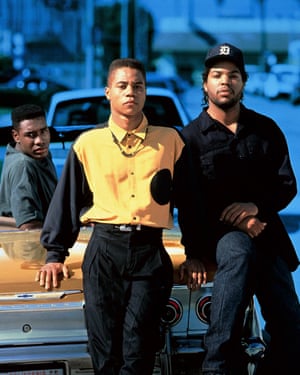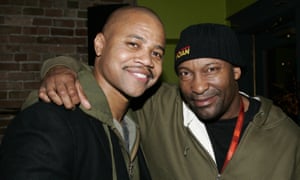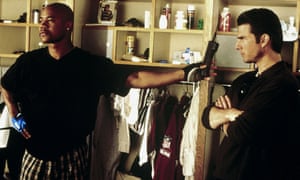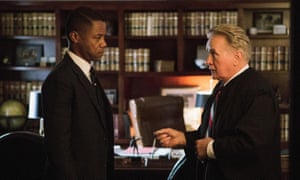"somebody asked me backstage, when I won the Oscar: ‘Did you ever imagine this?’ And I was like, ‘Never in a million years!’ But it was bullshit. It was a lie,” Cuba Gooding Jr admits. “I used to practise my autograph in math class. I would envision myself holding that Oscar above my head. The real success stories are the people who truly believe they are going to be famous, so they mentally prepare. And that’s what I was doing my entire life: preparing for it.”
What Gooding hadn’t thought about was what to do next. That night in 1997, he won best supporting actor for his portrayal of footballer Rod Tidwell in Tom Cruise sports drama Jerry Maguire. It was the high point of his career, and his performance was sounforgettably dynamic that Tidwell’s“Show me the money!” catchphrase became part of the language. When Gooding went to pick up the Oscar, it was as if he was still in character. He backflipped and shouted, “I love you!” to his family, God, Tom Cruise and anyone else he could think of. When the background music swelled, rather than cutting him off, it soundtracked a crescendo of gratitude that was both manic and sincere. Both on screen and off, Gooding’s energy shook up the place. The audience gave him a standing ovation.
After Jerry Maguire, they did show him the money; possibly too much of it. The commercial hits steadily gave way to critical bombs, followed by “10 years in the wilderness”, as Gooding puts it. “I got to buy both my mom and my wife’s mom a house. I was on private jets and I was doing the limos, and then, all of a sudden, I was broke again.” He spent a decade drifting from one straight-to-DVD film to the next.
But in recent years Gooding has been clawing his way back. In 2016, he returned to global attention with the acclaimed Ryan Murphy series The People v OJ Simpson; now he’s leading a London revival of the musicalChicago, playing the male lead, lawyer Billy Flynn, who defends a murderous showgirl. Today he looks well considering he’s just finished a long day of dance rehearsals. “It’s like doing an extreme workout,” he says, slouching on the sofa in a London studio. Musicals seem such a natural fit for a showman like Gooding, it’s surprising he hasn’t tried it before. Singing and dancing have always been part of his life; his parents were both singers: his mother in 60s group the Sweethearts; his father in R&B group the Main Ingredient, who had a million-selling hit in 1972 withEverybody Plays The Fool.
But it was precisely because of this musical heritage that Gooding never sought to follow in his parents’ footsteps. They moved from New York to Los Angeles when he was four and separated two years later; his mother raised Gooding and his two siblings alone. “My father wasn’t there a lot of my upbringing,” he says. “I always kind of blamed him not being there on the music that he did. I can remember being five, six years old, falling asleep with music blaring through the house. My father would put on an album and play it on a loop over and over again – his own music, Sam Cooke, Al Green, Marvin Gaye, Stevie Wonder, all that R&B. The music played in the house when he came home for two or three weeks, then he was gone for six months. So when it was very loud in my house, it represented my dad being home.”

His mother was unable to afford a deposit on an apartment and they moved from place to place, living in cheap hotels or even in their car. At one point his mother had to lie to get into a shelter for abused women because the family hadn’t eaten for days. Rather than go “home”, Gooding would go to an after-school club. He channelled his energies into sports, gymnastics, breakdancing and eventually drama. “I’d gone through a lot of stuff by the time I was 18,” he says. “I was going to school and being, like, nothing was wrong and I had this wonderful life and my dad was a famous singer, but then going home and sneaking in the back of a hotel, and just really sordid stuff. When you tap into that, it gives you the colours you need as an actor.”
Some actors talk of digging deep within themselves to summon emotion; for Gooding, it seems to be the opposite. Performance is a release; keeping a lid on his emotions is the hard part. He’ll burst into tears as readily as laughter. “I have a lot of emotional content,” he admits, momentarily lapsing into a Bruce Lee impersonation. “It gives you all the colours of the rainbow right there at your fingertips. It’s a real good gift to have as a storyteller. I knew if there was an emotional moment needed in the script, I would bring a truth to it that no one else who was auditioning had. I knew I had this thing that nobody else had.”
At high school, he acquired a reputation as a “wonder kid”. At 16 he performed with a breakdancing crew at the 1984 Olympics (behind Lionel Richie at the closing ceremony); he later won a prize at the California Shakespeare festival for his Othello monologue, which he finished off with a backflip. The mother of a fellow student was a talent agent. She came to see his high school graduation performance and signed him up. “She said, ‘You can do comedy and drama the same.’”
As he narrates it, having a famous dad also fuelled Gooding’s sense of his own destiny, hence the autograph-practising in maths class: “I was going to be like him. This was just temporary. Even though I was around a lot of kids who were poor, I never saw myself as them. I saw myself as almost like stepping down among the common people before the king said, ‘Hey, this is my son’ and I got the crown again. Ain’t that funny? I’m just realising that now.” He’s sitting up on the sofa now, more animated and engaged. Occasionally, he slaps my leg to emphasise a point.

Sure enough, he didn’t have to wait long for a break. John Singleton didn’t hesitate to cast him in his 1991 debut Boyz N The Hood, as a serious-minded kid sent to live with his authoritarian dad in deprived South Central Los Angeles. “I would say, ‘Don’t fucking smile unless I tell you to!’” Singleton tells me. “Because he’ll smile at the drop of a dime. He has a great big, shining personality. He’s funny. He’s a jokester. When things got really serious, he’d just drop his drawers and moon the crew. But he’s a very good actor, because going into that zone really makes him uncomfortable. When you see him play tense roles, he has this look on his face. His uncomfortableness is real.”
Boyz N The Hood was a breakout hit at a time when African American cinema was finally coming into its own, spearheaded by Singleton, Spike Lee and others. But Gooding didn’t make any more “African American” movies, despite many offers. “I said no to all of that. Because, in my head, I’m an actor who does all the parts, just like when I was doing Shakespeare in high school.”
Instead, he took more mainstream Hollywood roles: a navy corporal in A Few Good Men, sidekick to Paul Hogan in comedy-western Lightning Jack, a helicopter pilot in the Dustin Hoffman disaster movie Outbreak, all leading up to Jerry Maguire. “Now I’m moved away from the title ‘black actor’ and now I’m just an entertainer.
“I remember when I did Boyz N The Hood, everybody was like, ‘Yeah, but can he do comedy?’ Then I won for Jerry Maguire and they’re, ‘Yeah, but can he do drama?’” Not everyone was pleased about Gooding’s Oscar success. Spike Lee implied his performance, both in Jerry Maguire and at the Oscars, was in the tradition of servile African Americans ingratiating themselves with white audiences. “That kind of entertainment will keep you working,” Lee said. He also lampooned Gooding in his 2000 satireBamboozled, in which a black character dances on stage after winning an award and shouts, “Show me the money!”

“Listen,” Gooding says, “I’ll never forget when I got a call from Denzel Washington to say congratulations on winning the Oscar. Oh, I cried. I got a bottle of champagne from Quincy Jones, who said, ‘You’re part of the family now.’ Oh, I cried again. Sidney Poitier reached out to me. These blew my mind. And then I got the message that Spike Lee gave an interview saying I’m evil… Do you take it personally? No. Of course it would look like that to him, because he was stigmatised as a ‘black’ film-maker. And yet we, theentertainers who were black, were celebrated in different genres and given different opportunities.” He points to young black film-makers such as Black Panther’s Ryan Coogler andMoonlight’s Barry Jenkins. “It will be interesting to see if they get put in the same box, like they did with the Singletons and Spike Lees, or if they’re accepted as just film-makers who have their ways to tell a story.”
Gooding arguably transcended racial boundaries in his pursuit of universal recognition, but he also missed opportunities. On the set of Jerry Maguire, director Cameron Croweadvised Gooding to work only with good directors, but Gooding turned swathes of them down: Steven Spielberg (for Amistad), Michael Mann (Collateral), Terry George (Hotel Rwanda), even the lead in Taylor Hackford’s Ray Charles biopic, for which Jamie Foxx won the best actor Oscar. “I had all these big directors offering me roles, and I read their scripts and said, ‘I don’t think this part is right for me.’ And what happens is, if you offend enough big directors, you get taken off their lists.”
The offers dried up and the turkeys piled up. Gooding went from bloated epics such as Pearl Harbor to kids’ comedies such as Snow Dogs to grownup would-be comedies such asBoat Trip (in which he played a heterosexual man who mistakenly signs up for a gay cruise). “For years I’ve been waiting for [Gooding] to just go away. If this dud comedy is any indication of the scripts he’s getting, we may not have to wait much longer,” said one catty but prophetic review of Boat Trip. Gooding sank even further into generic action movies with titles such as Ticking Clock, The Way Of War and Wrong Turn At Tahoe.
“Oh yeah, I did some real clunkers,” he admits.
Was it about the money?
“Not for me. For me, it was always about protecting the sanctity of that golden statue… Because I felt I needed to show people that I can do more, I can do better.” The responsibility of having an Oscar inhibited his choices, he seems to be saying, although turning down Hotel Rwanda and Ray to make Wrong Turn At Tahoe suggests the logic was somewhat flawed. He knows it now. “You say those things to yourself when what you should be saying is, ‘No, fucker, you get paid to practise, so whatever it is, take it and practise and get better!’” Then he adds, “You just reminded me of another one – I’m kicking my balls in this interview – I was offered Idi Amin in The Last King Of Scotland. And I said to myself, ‘I can’t do that. He’s a bad guy!’”
These days, he’s taking Crowe’s advice and working with good directors: Lee Daniels in The Butler, Ava DuVernay inSelma and, most prominently, Ryan Murphy for The People v OJ Simpson – playing exactly the kind of “bad guy” he’d once have turned down. Gooding didn’t hesitate when he got the call: “All I heard was ‘Ryan Murphy’. I didn’t even hear ‘OJ’. I was like, ‘What do I need to do?’” Gooding’s Simpson was a piece of stunt casting, arguably – he bears little physical or vocal resemblance to Simpson – but he threw himself into the role, embraced the psychopathic end of his spectrum, and put himself back on the radar. Making OJ also enabled a reunion with Singleton, who directed one of the episodes. On their first day together, Singleton says, he halted shooting and waved Gooding over. “We both went into the corner together and we both started crying. We started this shit together, man, and look at us now. We had a good cry. He’s my brother, man.”

In addition, Gooding recently directed his first movie: Louisiana Caviar, a New Orleans-set drama he describes as “my answer to Crash or Pulp Fiction”. His experience on all those straight-to-DVD clunkers gave him an education in film-making. He hopes to do more of it, but for now, it’s Chicago.
There’s the sense of a new chapter for Gooding off-screen as well as on. He turned 50 at the beginning of this year. Last January, he divorced from his wife of 22 years, Sara Kapfer, with whom he has three children. A few months after that, Gooding’s father was found dead in his car, of natural causes. There is still no shortage of “emotional content” in his life, it seems.
“I felt like I turned 50 a long time ago,” Gooding says, “so when the actual number caught up with the experience I’ve had, it wasn’t as monumental as a lot of people want to make it. I step into many different lives, then I step back into this neutral place, and that neutral place turned 50, but mentally I’ve been there over and over again. Playing different characters, what it’s taught me is that experience gives you character, and when you survive something, it leaves an imprint on you that prepares you for the next something.”
Inside, he still feels like “the wonder kid”, he admits. “My mom said, ‘Don’t ever lose your smile.’ She said, ‘You have a God-given joy. Don’t ever let people take that from you.’ I understand the power in that now.



0 comments